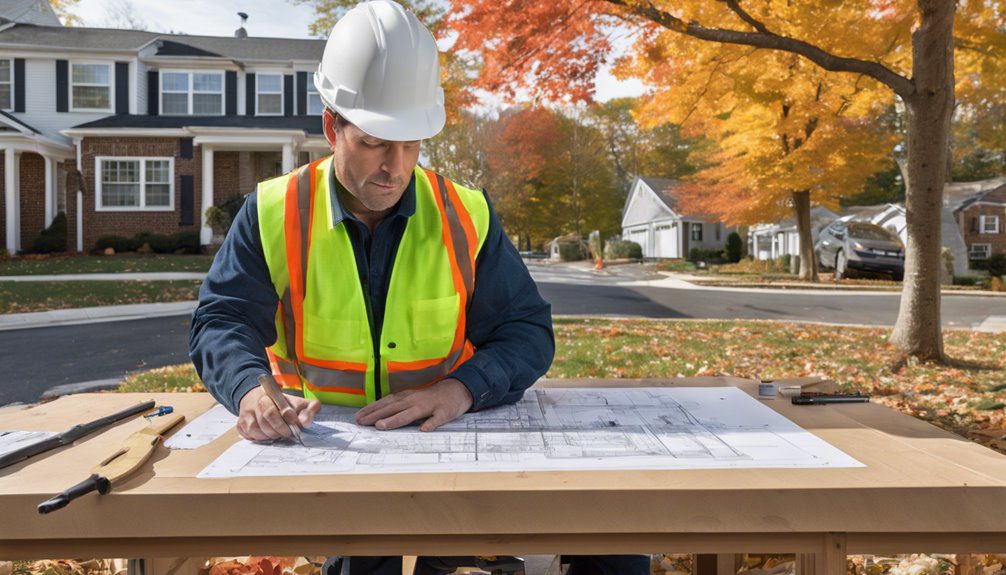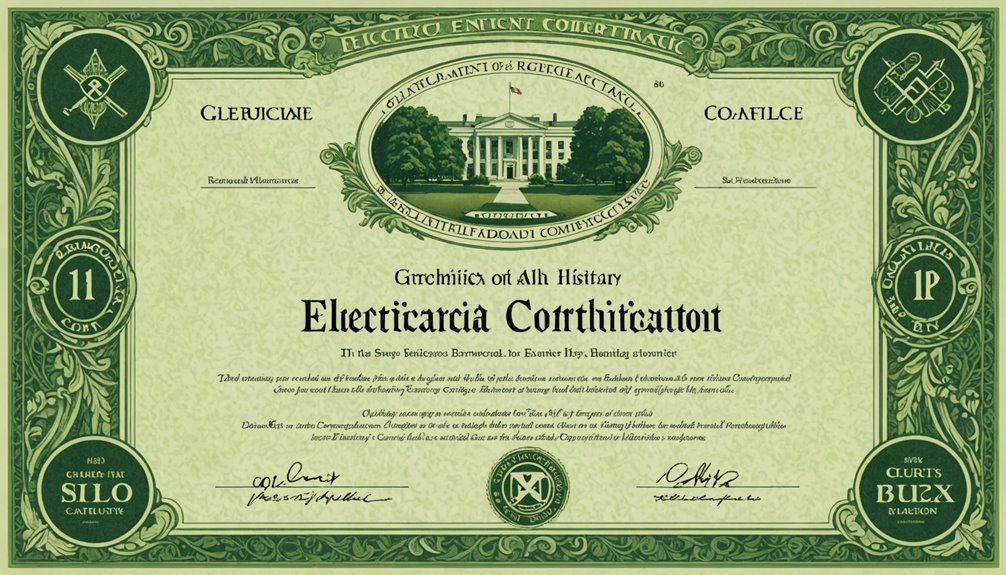If you're an electrical contractor in Fairfax County, you might already know the importance of securing an electrical contractor bond. This bond isn't just a formality; it plays a crucial role in safeguarding your clients and enhancing your credibility. However, navigating the requirements to obtain this bond can be a bit complex, and understanding the implications for your business is essential. What steps do you need to take to ensure compliance, and how can this bond ultimately affect your reputation in the industry? Let's explore these questions further.
Understanding Electrical Contractor Bonds

Have you ever wondered what an electrical contractor bond really means? It's a crucial safeguard in the construction industry, ensuring that electrical contractors adhere to regulations and complete their work to a high standard.
Essentially, this bond acts as a contract between you, the contractor, and a surety company. If you fail to meet your obligations, the surety can compensate your clients for any financial losses.
When you obtain an electrical contractor bond, you're not just showing your professionalism; you're also giving your clients peace of mind. They know that if something goes wrong—like faulty wiring or code violations—they can seek compensation.
This bond is often a requirement for obtaining licenses or permits to operate legally in Fairfax County.
Additionally, it reflects your commitment to ethical business practices. By securing a bond, you're demonstrating your willingness to stand by your work and take responsibility for any potential mishaps. This bond acts as financial security for your clients, ensuring that funds are available if obligations are unmet.
Importance of the Bond
The importance of an electrical contractor bond can't be overstated; it serves as a safety net for both you and your clients. This bond guarantees that you'll adhere to local regulations and industry standards, ensuring quality work.
When clients hire you, they want peace of mind knowing you're financially responsible and trustworthy. A bond acts as a promise that you'll complete projects as agreed, which can help you secure more contracts.
Additionally, if a dispute arises, the bond can cover any financial losses incurred by your clients, giving them confidence in your services. This not only protects them but also enhances your reputation as a reliable contractor.
In today's competitive market, having a bond sets you apart from others who may not have this assurance in place.
Moreover, obtaining a bond often demonstrates your commitment to professionalism and accountability. It shows that you're serious about your business and willing to invest in your credibility.
Ultimately, having an electrical contractor bond is essential for fostering trust, building strong client relationships, and ensuring long-term success in your contracting career. Furthermore, it is important to note that some states, including Illinois, require a specific type of surety bond to ensure compliance with industry standards.
Bond Requirements in Fairfax County

Understanding the bond requirements in Fairfax County is vital for any electrical contractor looking to operate legally and successfully. To begin with, you'll need to secure a contractor's bond, which serves as a financial guarantee that you'll comply with local regulations and industry standards. Typically, the bond amount required varies based on the scope of your work, but it's essential to check with local authorities for specific figures.
Additionally, you'll need to ensure that you're licensed before applying for a bond. Fairfax County mandates that all electrical contractors hold a valid license issued by the Virginia Department of Professional and Occupational Regulation. This license confirms your qualifications and expertise in the field.
Moreover, be prepared to provide detailed information about your business, including your experience and any relevant insurance coverage. The bond is designed to protect clients and the community from potential financial losses due to negligence or failure to adhere to regulations. Partnering with a reputable bonding company will not only facilitate the process but also provide insights into local regulations that may affect your bond acquisition.
It's crucial to partner with a reputable bonding company to facilitate the process and ensure you meet all local requirements. Keeping these factors in mind will help you navigate the bond requirements effectively and set you up for success in your contracting endeavors.
Steps to Obtain the Bond
To successfully obtain your electrical contractor bond in Fairfax County, start by gathering the necessary documentation.
You'll typically need a completed application form, proof of your business license, and any certifications that demonstrate your qualifications. Make sure to have your personal identification and any existing business documents ready as well.
Next, contact a surety bond provider. Compare different providers to find the best fit for your needs.
Once you select a provider, submit your application along with the required documents. The surety will then evaluate your financial history and creditworthiness, which may include a background check.
After your application gets approved, you'll receive the bond agreement. Louisiana surety bonds can provide a good reference for understanding the types of bonds available and their purposes.
Review it carefully to ensure that all terms are clear and acceptable. Once you've signed the agreement, your provider will issue the bond, and you'll need to file it with the appropriate Fairfax County authority.
Cost of the Electrical Contractor Bond

When budgeting for your electrical contractor bond in Fairfax County, it's essential to consider various factors that influence the overall cost. The bond amount typically required by the county may range from $5,000 to $15,000, depending on the specific license and scope of your work.
The premium you pay for the bond usually falls between 1% to 3% of the total bond amount, so understanding your needs is crucial.
Your credit score plays a significant role in determining the premium. If you have a strong credit history, you may secure a lower rate, while a poor credit score could lead to a higher premium.
Additionally, the surety company you choose can impact the cost, as different providers may have varying pricing structures and requirements.
It's also wise to factor in any additional fees or costs that may arise during the bonding process, such as application fees or administrative costs. Understanding the importance of surety bonds can help you make informed decisions about your bonding needs.
Common Challenges Faced
Navigating the process of obtaining an electrical contractor bond in Fairfax County can present several challenges. One of the primary hurdles you might face is understanding the specific requirements set forth by local regulations. Each jurisdiction can have its own rules, and keeping track of these can feel overwhelming.
You may also encounter difficulties in gathering the necessary documentation. Insurers often require extensive paperwork, including proof of experience, financial statements, and other certifications. This can lead to delays if you're not prepared.
Another common challenge is managing the costs associated with the bond. While you've already considered the base premium, keep in mind that additional fees may arise. These can include underwriting fees or costs for required insurance policies, impacting your overall budget.
Additionally, you might find it challenging to choose the right surety company. With many options available, it's crucial to research and find a reputable provider who understands your specific needs.
Lastly, the approval process can be lengthy, and unexpected issues can arise, prolonging your wait time. Being aware of these challenges can help you navigate the process more smoothly. Furthermore, understanding that bond amounts typically reflect the level of risk associated with the industry can aid in financial planning.
Maintaining Your Bond Status

Maintaining your bond status is crucial for ensuring your electrical contracting business operates smoothly in Fairfax County. To keep your bond active, you'll need to stay on top of your financial responsibilities. Regularly review your bond's terms and conditions to ensure compliance with local regulations.
Make timely payments for your bond premiums; missing a payment can jeopardize your status. Keep all necessary documentation organized and accessible. This includes proof of insurance, licenses, and any required permits. Failing to have these documents can lead to complications with your bond.
It's also important to maintain a good reputation. Stay responsive to client concerns and resolve any disputes quickly. A history of complaints can negatively impact your bond status.
Additionally, consider attending workshops or training sessions to stay updated on industry standards and best practices. Regularly assess your business practices to ensure they align with the expectations set by your bond provider. Ensuring compliance with local and state regulations is essential for maintaining your bond and protecting your business.
Resources for Contractors
Contractors in Fairfax County can benefit from a variety of resources that help streamline their operations and enhance their skills. One valuable resource is the Fairfax County Department of Public Works and Environmental Services, which offers guidance on local regulations and codes. Familiarizing yourself with these regulations ensures compliance and helps avoid costly fines.
Another great resource is local trade associations, such as the Virginia chapter of the National Electrical Contractors Association (NECA). These organizations provide networking opportunities, training programs, and access to industry updates, helping you stay informed and connected.
You should also explore online platforms like the Virginia Department of Professional and Occupational Regulation (DPOR), where you can find essential information on licensing requirements and continuing education. Additionally, online forums and social media groups can be useful for sharing experiences and gaining insights from fellow contractors.
Lastly, consider investing in professional development courses or workshops to sharpen your skills. Many community colleges and technical schools in the area offer classes tailored for electrical contractors.
Utilizing these resources won't only improve your expertise but also position you for greater success in your contracting career.
Conclusion
In conclusion, obtaining an electrical contractor bond in Fairfax County is crucial for your business's success and reputation. By ensuring compliance with local regulations and protecting your clients, you demonstrate your commitment to ethical practices. Follow the outlined steps to secure your bond and stay informed about any requirements to maintain its status. With the right preparation, you can build trust with your clients and establish a solid foundation for your contracting career.

